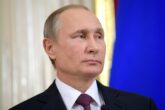May 19, 2014
China Has Russia Over a Barrel
Chinese officials are notoriously tough negotiators, especially when they know you're in a pinch. Just ask Gazprom, Russia's natural gas giant, which is on the brink of capitulating to Beijing on a massive energy project, 10 years in the offing. Gazprom and China National Petroleum Corp., one of China's oil giants, are gearing up to sign a 30-year multibillion-dollar deal to send natural gas from Russia to China through a colossal new pipeline network.
A week before Russian President Vladimir Putin was set to meet his Chinese counterpart, Xi Jinping, in Shanghai on May 20-21, Russia's deputy energy minister described the deal as "98 percent ready." However, a Chinese deputy foreign minister was far cagier, noting in mid-May: "We are still exchanging views with Moscow, and we will try our best to ensure that this contract can be signed and witnessed by the two presidents."
On the surface, this seems the kind of win-win outcome that Chinese diplomats regularly tout as the solution to nearly every international problem. Russia sits on the world's largest natural gas reserves, much of it buried in the Siberian hinterland north of its border with China. As the world's largest energy consumer, China is an obvious partner for Russia's economy, in which natural resources make up 70 percent of exports and over 50 percent of government revenue.
But energy trade between Russia and China is surprisingly limited, with only 9 percent of China's oil imports and 1 percent of its gas imports coming from Russia. China is eager to increase and diversify its energy supplies away from overreliance on expensive and volatile sources in Africa and the Middle East that have to pass through precarious sea lanes in the Strait of Hormuz and the South and East China seas. (Beijing really does worry about all the talk among U.S. strategists on how to blockade China's energy supplies in the event of armed conflict.)
Yet China has been unwilling to pay the premium prices that Russia has traditionally charged in Europe. Now, with Russia's worsening economy and an increasingly competitive Asian energy market, Beijing holds most of the cards -- and time is not on Moscow's side.
More from CNAS
-
Trump ‘Humiliated’ as Putin Sends Clear Message That He Doesn’t Care About US
"Putin is not playing ball." Putin's Palm Sunday attack on Sumy is "embarrassing for the White House" as it comes just days after Steve Witkoff met with the Kremlin, says adju...
By Jim Townsend
-
The Hidden Past and Uncertain Future of the U.S. and Ukraine with Celeste Wallander
Under the Trump administration, U.S. support for Ukraine is no longer guaranteed. President Trump's pause on aid and intelligence to Ukraine in March may have been brief, but ...
By Andrea Kendall-Taylor, Jim Townsend & Celeste Wallander
-
Is Russia Under Pressure?
Since 2014, the United States and its allies have provided increasing military support to Ukraine while imposing more and tougher economic sanctions on Russia, especially sinc...
By Jeffrey Edmonds
-
Sharper: Russia and the Axis of Upheaval
Russia’s 2022 invasion of Ukraine served as a dramatic catalyst for strengthening the global axis of upheaval. To sustain its war effort, Russia has imported Iranian weapons a...
By Charles Horn




